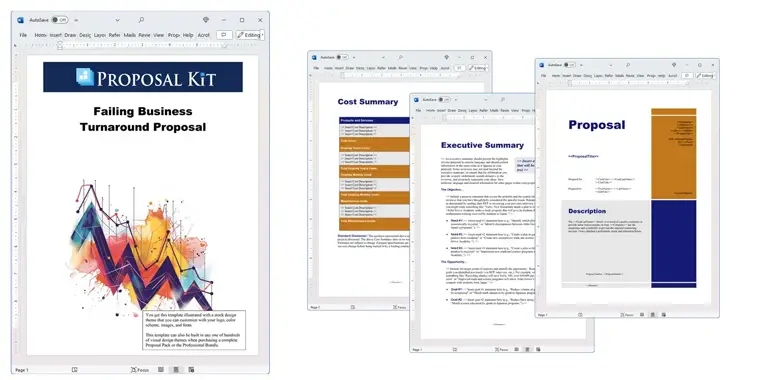How to write your Failing Business Turnaround Proposal
We include this 26 page layout with every Proposal Pack. If you want this template to have a different visual design theme than the one illustrated here, purchase any Proposal Pack design and create this template using the purchased design theme. This template is included in every Proposal Pack. If you get a Proposal Pack or the Professional, you can also make any variation of this template with different chapters to suit your needs.
We typically include more chapters in the templates than most people will need to give everyone more variety in the chapters they may need. You can trim down a long template by removing pages you do not need or combining multiple chapter topics into one page.
 DOWNLOADABLE, ONE-TIME COST, NO SUBSCRIPTION FEES
DOWNLOADABLE, ONE-TIME COST, NO SUBSCRIPTION FEESYou can also create countless variations of this document to suit your needs using the included library of 2200+ chapters if ordering a Proposal Pack or Professional.
 What Our Clients Say
What Our Clients SayThe Proposal Kit has helped me with the very basics of getting started. The templates are ones that are real world value and is a must for all businesses that want to bring about a change in the way you promote and grow your business."
Related Article
Related Video
Related Templates
- Business Plan to Restart Shuttered Business
- Joint Venture Proposal
- Business Plan Funding Request Proposal
- Business Development Proposal
- Corporate Restructuring Proposal
- Business Model Change Planning Rolling Shutdowns Proposal
- Bankruptcy and Foreclosure Crisis Report
What's the best way to write your failing business turnaround proposal?
The solution uses the Proposal Kit template and software package for those grappling with creating a failing business turnaround proposal. This tool offers a structured, efficient approach to drafting a proposal that clearly outlines your plans for recovery and profitability. Proposal Kit's comprehensive template library and Wizard software program streamline creation. The software includes a line item quoting database system for detailed financial projections like cost summaries, estimates, and budgets.
Are you in a position where you have to devise a strategy to revive a struggling business?
What Types of Projects Are Failing Business Turnaround Proposals Written For?
A failing business turnaround can involve diverse projects, including:
- Cost Restructuring: Reducing operational costs through more intelligent resource allocation.
- Revenue Model Revision: Altering pricing strategies to increase sales.
- Operational Overhaul: Redesigning processes to improve efficiency.
- Brand Repositioning: Refreshing the brand to enhance market appeal.
- Market Expansion: Entering new markets or demographics.
- Product Line Expansion: Adding new products to meet customer demands.
- Partnership Development: Forming alliances to expand reach.
- Customer Retention Strategies: Implementing programs to keep existing customers.
- Staff Training and Development: Enhancing staff skills to improve service and productivity.
- Technology Upgrades: Implementing new technology to improve business operations.
Chapters this template is built with
While there is no universal template for all scenarios, starting with a premade layout provided by Proposal Kit can help tailor your document to meet specific needs. Here's how various Proposal Kit chapter templates can be used.
These chapters are merely starting points. Proposal Kit's extensive template library can be customized to address all topics relevant to your specific turnaround situation.
Cover Letter
The cover letter introduces your organization and the proposal's intentions. It should personally address the recipient, giving an overview of your business and expressing a clear intent to revitalize and transform. This letter sets the tone for the proposal, establishing a connection with the reader and underscoring your commitment to returning the business to profitability.
Executive Summary
This section is crucial as it provides a concise overview of the proposal, highlighting the urgency of the turnaround and the viability of your strategies. Summarize the key points, such as the primary financial issues, changes, and the potential benefits of the turnaround plan. The executive summary should capture the essence of the proposal and motivate stakeholders to engage with the detailed content.
Needs Assessment
Analyze the current challenges faced by the business. This might include declining sales, rising costs, or market share erosion. Identify specific needs such as improving operational efficiency, enhancing product offerings, or restructuring debt. This assessment will form the basis for the turnaround strategies you propose.
Competitive Analysis
Examine your key competitors to determine your business's position in the market. Identify areas where competitors excel or fail, highlighting opportunities for your business to differentiate itself. This analysis helps to pinpoint advantages and potential areas for improvement.
Location Analysis
Evaluate how geographical factors impact business performance. This might involve analyzing foot traffic, local economic conditions, competitor presence, or logistical issues. Understanding these factors can help tailor strategies that leverage location strengths or mitigate weaknesses.
Trends
Investigate broader market trends that could impact the business. This includes changing consumer preferences, technological advancements, and economic shifts. By aligning the turnaround strategy with these trends, the company can better position itself for future success.
Present Situation
Provide an honest, clear overview of the business's current state. This should cover financial health, market position, and operational effectiveness. Transparency in this section helps build credibility with stakeholders and sets a factual basis for the proposed turnaround measures.
Goals and Objectives
Define specific, measurable goals and objectives for the short and long term. These include achieving particular revenue targets, reducing operational costs by a set percentage, or expanding into new markets. Clear goals help to focus the turnaround efforts and provide benchmarks for success.
Sales Plan
Develop strategies to increase sales volumes and revenue. This could involve introducing new products, entering new markets, or optimizing pricing strategies. The sales plan should be detailed, with clear steps and expected outcomes.
Action Plan
Outline a step-by-step guide for implementing the proposed strategies. Each step should include timelines, responsible parties, and required resources. This plan serves as a roadmap for the turnaround process, ensuring that all team members understand their roles and responsibilities.
Marketing Plan
Describe tactics to reposition the business in the marketplace. This could include rebranding, targeted advertising campaigns, or enhanced digital marketing strategies. A robust marketing plan is crucial for attracting new customers and re-engaging existing ones.
Traffic
Propose strategies to increase both physical and online customer traffic. Techniques include SEO optimization, social media engagement, or local events. Increasing traffic is vital for boosting sales and improving market visibility.
Market Demand
Analyze customer demand for the business's products or services. This analysis should identify which products are in demand, potential new product opportunities, and customer buying behaviors. Understanding market demand is critical to aligning product offerings with customer needs.
Projections
Provide financial forecasts that show the expected impact of the turnaround strategy. This includes revenue projections, cost savings, and profitability timelines. Accurate financial projections are essential for gauging the turnaround plan's potential success.
Obstacles
Identify potential challenges that impede progress, such as market resistance, financial constraints, or operational disruptions. Propose solutions to these obstacles to ensure the plan can proceed smoothly even when challenges arise.
Viability
Assess the plan's feasibility and potential success. This assessment should consider both internal capabilities and external market conditions. Viability analysis helps reassure stakeholders of the plan's potential for success.
Cash Flow Analysis
Conduct a detailed review of the company's cash flow under the new plan. This analysis should identify cash inflows and outflows, highlight periods of potential cash shortages, and suggest strategies for maintaining positive cash flow.
Breakeven Analysis
Calculate the point at which the business will start to generate profit under the new plan. This analysis helps to understand the financial impact of the turnaround strategies and sets realistic expectations for reaching profitability.
Recommendations
Based on the detailed analyses and assessments, suggest actionable steps that the business should take. These recommendations should be practical and aligned with the overall goals of the turnaround plan.
Company Operations
Propose changes to improve day-to-day operations. This might involve streamlining processes, adopting new technologies, or restructuring teams. Improving operational efficiency is crucial for reducing costs and enhancing service delivery.
Customer Service
Suggest enhancements to customer service to improve satisfaction and retention. This could include training staff, implementing new CRM systems, or introducing loyalty programs. Excellent customer service is critical to building brand loyalty and supporting revenue growth.
Roadmap
Provide a timeline showing key milestones and expected outcomes. This roadmap should outline the major phases of the turnaround and include specific dates for achieving each goal. It helps stakeholders visualize the plan's progression and sets expectations for deliverables.
Customer Survey
Propose surveying to gather customer insights about potential improvements. This survey can help identify customer needs, gauge satisfaction, and collect feedback on proposed changes. Customer insights are valuable for refining the turnaround strategy and ensuring it meets market demands.
Use cases for this template
Rescue Plan at RetroFash
Jenna, the owner of RetroFash, found herself at a juncture as declining sales and escalating debts threatened the survival of her vintage clothing boutique. To turn her business around, Jenna leveraged the Proposal Kit to articulate a comprehensive strategy to her investors. Her proposal detailed plans for rejuvenating RetroFash's brand appeal through a marketing overhaul, an online sales platform to capture new demographics in the e-commerce market, and a pricing restructuring to compete more in the fast-paced fashion industry.
Jenna's proposal was structured to showcase how these changes could drive increased online and in-store traffic, enhance customer engagement through targeted social media campaigns, and improve overall sales figures. Her proposal's clarity, thoroughness, and precision, supported by market analysis and projected financials, secured the necessary investment.
This funding enabled the implementation of the proposed strategies, leading to a remarkable turnaround in sales and a substantial improvement in customer engagement.
Quick Fix at TechSolve
At TechSolve, Liam, a project manager, was challenged to draft a proposal to prevent the closure of one of the company's tech support centers. With a deadline looming, Liam turned to the Proposal Kit and an AI writing assistant to expedite the process without compromising the quality or depth of the proposal. He integrated AI-generated insights about the center's performance and market needs with the structured, persuasive format provided by the Proposal Kit.
Liam's proposal emphasized the center's importance to TechSolve's overall operations and highlighted a revamped operational model that promised greater profitability through efficiency improvements and better alignment with client needs. The proposal not only outlined the quantitative benefits but also addressed potential concerns of the board regarding employee retention and customer satisfaction.
His well-written, data-backed proposal demonstrated the center's potential and operational viability, leading to a board decision to keep the center operational, saving numerous jobs and enhancing service delivery.
Vision for Non-Profit Revitalization
As the director of Green Horizons, a non-profit committed to environmental conservation, Sophia recognized the need for new funding to continue her organization's critical work. Facing the challenge of convincing potential donors of the value and impact of their projects, Sophia used the Proposal Kit to develop a detailed Request for Proposals (RFP) to attract new funding sources. Her RFP clearly outlined the organization's current challenges, such as limited resources and the need for advanced research tools, while highlighting opportunities for expansion and increased community impact.
Sophia's RFP was created to draw attention to the urgency of funding and build a case for investment by detailing the actionable steps Green Horizons would take to achieve its goals. The document clearly described past successes, ongoing projects, and future initiatives to foster sustainable environmental practices.
The clarity and persuasive power of the RFP, enhanced by Proposal Kit's professional layout and clear articulation of goals and needs, successfully captured the interest of several major donors. These contributions were instrumental in expanding Green Horizons' programs and extending their environmental impact, revitalizing the organization and strengthening its mission.
Conclusions and Recommendations
A well-written failing business turnaround proposal is essential for securing the support and resources needed to revitalize a struggling business. Each story underscores the versatility and effectiveness of the Proposal Kit in helping users navigate the complexities of proposal writing and achieve successful outcomes in their respective fields.
Also Known As
This template may also be referred to in different ways or be used in more specialized situations, such as:
- Business Recovery Plan
- Corporate Restructuring Proposal
- Business Revitalization Strategy
- Turnaround Management Plan
- Business Rehabilitation Proposal
- Corporate Renewal Plan
- Business Rescue Strategy
- Operational Improvement Proposal
- Financial Recovery Plan
- Business Revival Strategy
Abstract
 Turning around a failing business requires an approach that many business owners must navigate to achieve financial stability and long-term success. Addressing negative cash flow and declining employee morale involves identifying the root causes and implementing key performance indicators to measure progress. A successful business turnaround entails effective communication, stakeholder engagement, and investing in process improvements.
Turning around a failing business requires an approach that many business owners must navigate to achieve financial stability and long-term success. Addressing negative cash flow and declining employee morale involves identifying the root causes and implementing key performance indicators to measure progress. A successful business turnaround entails effective communication, stakeholder engagement, and investing in process improvements.
By understanding the target market and employing cost-cutting measures, business owners can create a clear vision that sets the path for resilience. Using a proposal tool like Proposal Kit can make a huge difference by providing a structured approach to writing turnaround plans that outline necessary changes and emphasize accountability.
In today's competitive environment, small businesses and other stakeholders must find the right strategies to stay competitive and avoid bankruptcy. The Proposal Kit offers templates and software that guide the creation of a comprehensive turnaround proposal. This includes assessing the struggling company's current challenges through a needs assessment, competitive analysis, and cash flow analysis.
 By using technology upgrades, market expansion strategies, and clear objectives, business leaders can align their operations with market trends and customer demands. Understanding financial projections and breakeven points gives businesses a clear picture of their financial health, enabling them to course-correct when setbacks occur.
By using technology upgrades, market expansion strategies, and clear objectives, business leaders can align their operations with market trends and customer demands. Understanding financial projections and breakeven points gives businesses a clear picture of their financial health, enabling them to course-correct when setbacks occur.
Businesses experiencing failure need advisors and leaders who possess the know-how to address underlying issues. By fostering a culture of continuous improvement and innovation, businesses can enhance their assets and operational efficiency. Engaging in effective communication with employees and other stakeholders builds confidence and motivation, which are crucial for overcoming obstacles.
A clear roadmap with milestones helps measure progress and maintain focus on long-term goals. Importantly, businesses must also focus on improving customer service and retention strategies to sustain growth. By doing so, business owners can ensure that their turnaround efforts result in a significant and positive impact on their financial accounts and overall success.
 In the complex landscape of business recovery, many business owners face the pressing challenge of implementing a successful business turnaround. This requires not only addressing immediate financial instability but also setting a foundation for long-term success. A clear vision and approach are important to navigate the issues of negative cash flow and declining employee morale.
In the complex landscape of business recovery, many business owners face the pressing challenge of implementing a successful business turnaround. This requires not only addressing immediate financial instability but also setting a foundation for long-term success. A clear vision and approach are important to navigate the issues of negative cash flow and declining employee morale.
Key performance indicators can be employed to measure progress and ensure that the right strategies are in place. By understanding the target market, businesses can tailor their approach to meet customer needs and enhance stakeholder engagement.
For small businesses, the stakes are particularly high. Failing companies must address underlying issues such as inefficient operations and unsustainable revenue models. Cost-cutting measures are crucial, but they must be implemented thoughtfully to avoid undermining employee morale or customer satisfaction.
 Effective communication and a structured proposal, as facilitated by the Proposal Kit, provide a roadmap for success. This involves writing a comprehensive plan that identifies root causes and outlines necessary changes, ensuring that leaders and stakeholders have a clear picture of the path forward.
Effective communication and a structured proposal, as facilitated by the Proposal Kit, provide a roadmap for success. This involves writing a comprehensive plan that identifies root causes and outlines necessary changes, ensuring that leaders and stakeholders have a clear picture of the path forward.
A successful turnaround requires an investment in process improvements and innovation, fostering a culture of resilience and accountability. Businesses must be agile and ready to adapt to market demands while maintaining a focus on core competencies. By developing a plan that includes cash flow management, operational enhancements, and customer-focused initiatives, companies can stay competitive and avert bankruptcy.
Continuous improvement is vital. Engaging with advisors can provide valuable insights and help course-correct as needed. Businesses should not only focus on immediate financial remedies but also consider long-term strategies for growth, such as market expansion and technology upgrades. Importantly, fostering a motivated workforce and maintaining stakeholder confidence are key topics of a successful turnaround.
 In conclusion, the ability to implement a successful business turnaround lies in the detailed planning and execution of a comprehensive strategy. By addressing financial stability, enhancing operations, and using insights, businesses can overcome setbacks and achieve significant improvements in both the short term and beyond.
In conclusion, the ability to implement a successful business turnaround lies in the detailed planning and execution of a comprehensive strategy. By addressing financial stability, enhancing operations, and using insights, businesses can overcome setbacks and achieve significant improvements in both the short term and beyond.
Frequently Asked Questions
What are the key components of a Failing Business Turnaround Proposal?
A comprehensive Failing Business Turnaround Proposal should include an executive summary, an analysis of the current situation, an identification of the main issues causing the business decline, a detailed action plan outlining the strategies for improvement, a timeline for implementation, a financial plan addressing budget and funding requirements, and performance metrics to monitor progress. It should also include a risk management plan to anticipate and mitigate potential challenges.
How do I conduct a thorough analysis of the current situation?
Conducting a thorough analysis involves evaluating internal and external factors affecting the business. Internally, review financial statements, operational processes, and organizational structure. Externally, analyze market conditions, competition, and industry trends. Gathering input from employees, customers, and stakeholders can provide valuable insights. Use tools like SWOT (Strengths, Weaknesses, Opportunities, Threats) analysis to assess the business's situation.
What strategies should I consider for turning around a failing business?
Effective turnaround strategies include cost reduction measures, restructuring debt, improving operational efficiency, diversifying product or service offerings, and enhancing marketing efforts. Focusing on core competencies, strengthening customer relationships, and exploring new revenue streams are also crucial. Each strategy should be tailored to address the issues identified in the initial analysis.
How do I create a realistic and achievable action plan?
Creating a realistic action plan involves setting clear, achievable goals with specific, measurable objectives. Prioritize actions based on their potential impact and feasibility. Break down the plan into manageable steps, assign responsibilities, and establish a timeline with milestones to track progress. Ensure that the action plan is flexible enough to adapt to changing circumstances and challenges.
How can I effectively communicate the turnaround plan to stakeholders?
Effectively communicating the turnaround plan involves presenting it clearly and confidently, highlighting the benefits and expected outcomes. Use straightforward language and support your plan with data and analysis. Address stakeholders' concerns and provide reassurances about the viability of the plan. Regular updates on progress and transparent communication are essential to maintain stakeholder trust and support throughout the turnaround process.
20% Off Discount
![]() Add To Cart This Word Template
Add To Cart This Word Template
 Add To Cart Proposal Pack for Any Business
Add To Cart Proposal Pack for Any Business
 Add To Cart Proposal Kit Professional
Add To Cart Proposal Kit Professional
 4.7 stars, based on 849 reviews
4.7 stars, based on 849 reviewsProposal Kit chapters used in this template
Cover Letter, Title Page, Table of Contents, Executive Summary, Needs Assessment, Goals and Objectives, Present Situation, Viability, Trends, Competitive Analysis, Location Analysis, Company Operations, Customer Service, Customer Survey, Sales Plan, Marketing Plan, Traffic, Market Demand, Cash Flow Analysis, Breakeven Analysis, Projections, Obstacles, Roadmap, Action Plan, Recommendations, Back Page
Line Item Automated Chapters
If you purchase a Proposal Pack or the Professional Bundle, these proposal pages are generated using an automated line-item database in the included Wizard software.
Cash Flow Current Year, Breakeven Analysis
You use this proposal for
- General business proposal
- Non-technical proposal
- Project pitch proposal
- Internal company proposal
How to create this template with Proposal Pack Wizard
You can create this document using any of the logo-designed Proposal Packs. Pick any Proposal Pack with a logo design theme you like best; they will all work equally well. The Proposal Pack for Any Business is the pack with no extra added logos or colors - designed to be used plain or for you to customize with your logos and graphics.
The Proposal Pack design theme you purchase will determine the visual look of this template. The screenshot above only shows the plain generic design theme.
We include a library of chapters to be assembled based on your needs. All proposals are different and have different needs and goals. We designed Proposal Pack so you can customize the documents to suit your needs.
You will best create this document using the Proposal Pack Wizard - Expert Edition software to select this template and build it in the Proposal Pack logo design theme of your choice along with any desired customizations (such as adding additional chapters, removing unneeded chapters, changing the order of chapters, and importing your company logo). This template outlines a proposal for the described situation. Each user is responsible for typing in the actual content of the provided pages with their information to complete the proposal. Suggestions in the abstract may include features in higher-end packages and are facilitated by the selection of chapter templates to support the narrative of each proposal, which help guide the user in filling in the details.
The Wizard software's AI Writer will write the content of the pages of the template based on details provided for your company, client, project, financial details and other writing instructions. This will provide a personalized version of the template completely written and ready to edit.
Once finished, the AI Writer's Word-to-PowerPoint converter can transform your proposal, business plan, or other business documents into a PowerPoint slideshow. Save time and effort by letting the AI analyze every chapter to condense its content into talking points, visually matching the document, and providing a consistent package of presentation material with the click of a button.
You create this template using the Wizard software with an entire Proposal Pack library and software. We include the Expert Edition of the software in the Proposal Kit Professional. Microsoft Word for Windows is required to use the customizing software. You can also edit Word document templates in other office software such as Word for Mac. We will assist Mac users in assembling complex templates for their first project if they do not have the required platform to run the Wizard software.
How to Build Templates Featured on Proposal Kit Website
Many people find the Proposal Kit website after searching for a specific proposal. Once you've purchased and installed the software, how do you build that template you found in the first place? This video shows you how to build any proposal you see on the Proposal Kit website.
 Ian Lauder has been helping businesses write their proposals and contracts for two decades. Ian is the owner and founder of Proposal Kit, one of the original sources of business proposal and contract software products started in 1997.
Ian Lauder has been helping businesses write their proposals and contracts for two decades. Ian is the owner and founder of Proposal Kit, one of the original sources of business proposal and contract software products started in 1997.By Ian Lauder
 Published by Proposal Kit, Inc.
Published by Proposal Kit, Inc.


 Cart
Cart
 Get 20% off ordering today:
Get 20% off ordering today: 


 Facebook
Facebook YouTube
YouTube Bluesky
Bluesky Search Site
Search Site